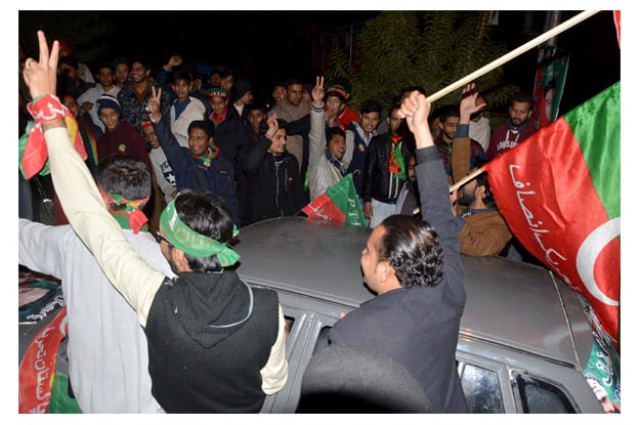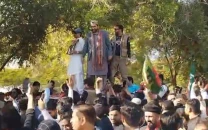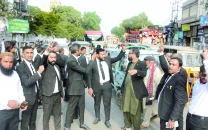Ruling party, PTI in a close tangle
PTI takes lead in urban UCs; PML-N dominates rural areas

PTI takes lead in urban UCs; PML-N dominates rural areas. PHOTO: EXPRESS
In the first-ever local government elections in the federal capital on Monday, the ruling Pakistan Muslim League-Nawaz (PML-N) and the Pakistan Tehreek-e-Insaf (PTI) scrambled to get ahead of each other, with Nawaz Sharif’s party narrowly holding the edge.
Unofficial results collated from 44 of the 50 union councils show that the PML-N has won 20 UCs, followed by the PTI with 18 and independent candidates with six.
New strategy: PTI shifts its focus to national issues
According to the Election Commission of Pakistan, 2,407 candidates – 972 (or some 40%) independents, 506 of the PML-N and 479 of the PTI among others – were in the race for 600 seats across Islamabad.
The PTI obtained a majority of its seats from the urban areas of the capital, while the PML-N found more success in the rural localities.
Polling started at 7am and continued uninterrupted until 5:30pm amid a more or less peaceful atmosphere. A spokesman for the ECP said they had received 51 complaints largely related to minor clashes between political activists, changes in the announced polling scheme, misbehaviour of the polling staff and police officials, etc.
Some 21 candidates, 10 non-Muslim, six general members, three women, and one youth member were elected unopposed.
Rigging allegations: Govt accused of facilitating PML-N candidates
In a major upset, PML-N’s former senator Zafar Ali Shah, who was a candidate for chairman in UC-30, lost to a PTI candidate.
Meanwhile, the PTI candidate from the Bani Gala UC also faced defeat.

Voter turnout apparently remained below expectations, largely because no public holiday had been announced by the government. Educational institutions were closed though. Business centres , however, remained open as usual across the city.
Government, semi-government and private offices remained open until 2pm, as the government had on Sunday announced relaxing office timings by almost 2 hours to facilitate the voters.
Independent observers believe that the turnout was lower than that recorded in Islamabad in the general elections of 2008 and 2013, which was 50% and 62%, respectively. The turnout on Monday was believed to be roughly 40%.
Until 5:30pm, some 430 votes of the total registered 1,116 were cast at the polling station-I of Sector G-9/2. However, in rural Islamabad the situation was slightly better in terms of turnout.
Until the filing of this report, PML-N candidates were in the lead in the rural parts of the capital, while the PTI dominated the urban UCs.
A total of 640 polling stations – 261 for men, 256 for women and 123 combined – were set up across the city, with a total of 2,156 polling booths. Some 640 presiding officers and 6,468 assistant presiding officers performed their duties.
Islamabad has a total of 676,795 registered voters (almost one per cent of Pakistan’s registered voters) – 366,899 men and 309,896 women.
Complaints
The Secretariat police lodged a first information report on the complaint of returning officer Capt (retd) Waqas Rashid against assistant returning officer Sabiha Bibi, who was accused of changing her election duties. Arrest warrants were also issued for ARO Faiza Anjum, who was found absent from duty.
Karachi show: Rulers must learn from history, says Bilawal
In UC-6, six polling agents were found taking pictures of the ballot papers, while polling stopped earlier than the fixed time in Ward 3 of UC-5 due to a clash between PML-N and PTI workers.
In G-9/2, polling agents accused the ECP of changing polling schemes at the eleventh hour. Moreover, polling commended later than the fixed time at three polling stations in UC-6 and UC-4.
Chief Election Commissioner Justice (retd) Sardar Muhammad Raza inspected two polling stations in Sector F-10 to monitor the electoral process. Islamabad police chief Tahir Alam also visited different polling stations to check the security arrangements.
Published in The Express Tribune, December 1st, 2015.

1675249047-0/image-(18)1675249047-0-208x130.webp)

















COMMENTS
Comments are moderated and generally will be posted if they are on-topic and not abusive.
For more information, please see our Comments FAQ